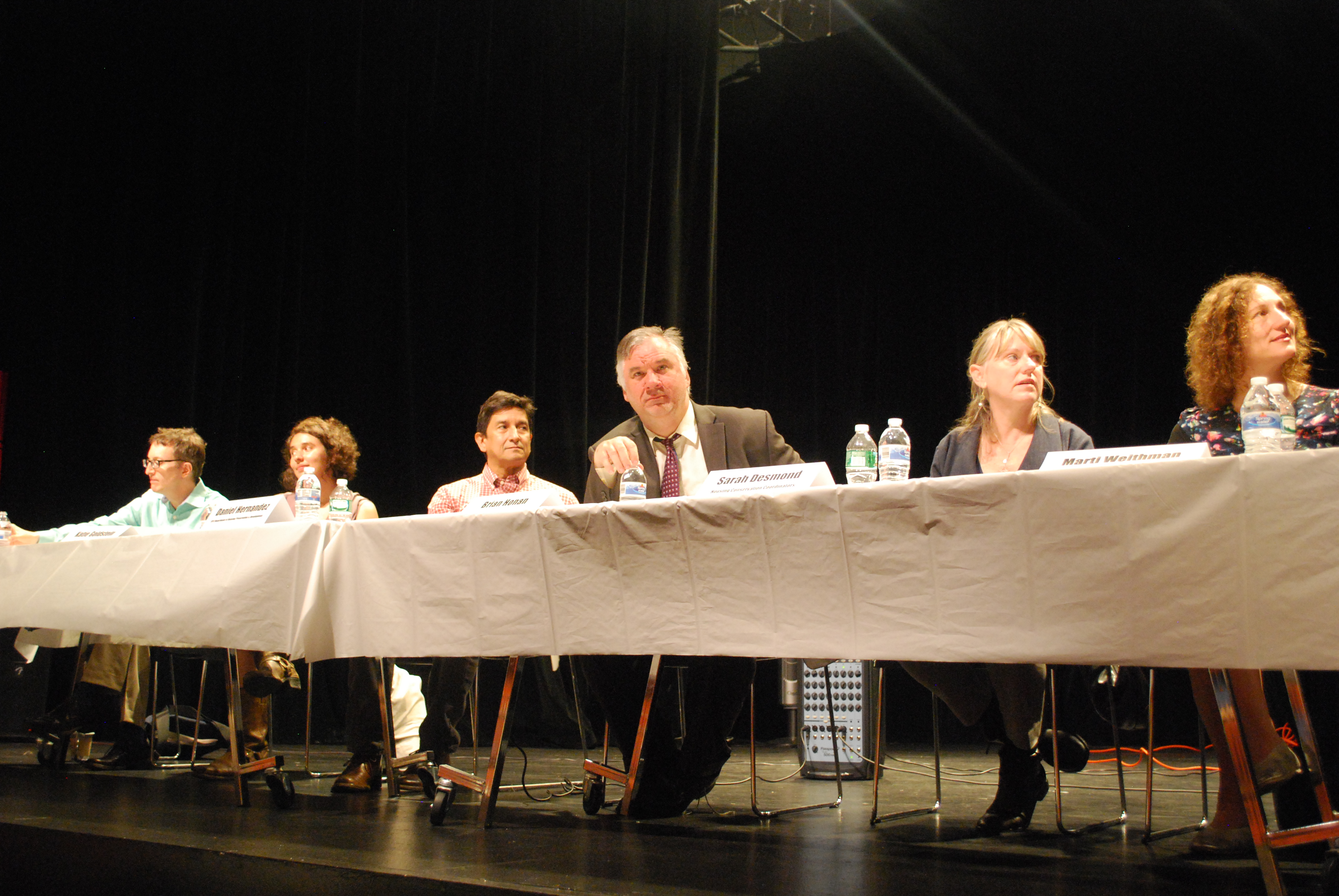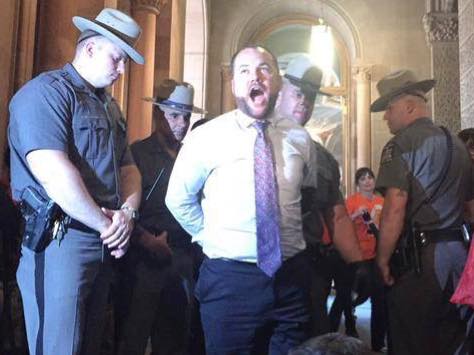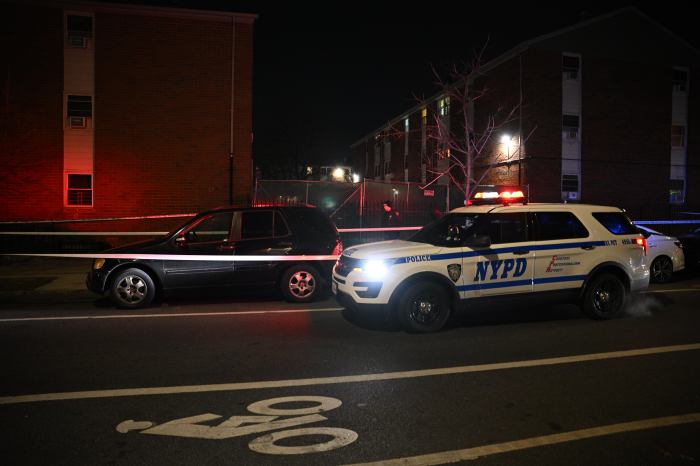
BY WINNIE McCROY | On a day when the sun shone brightly over happy children playing in a bouncy castle at the street fair on W. 26th St., few people would have opted to stay indoors. But for the 70 individuals who gathered at Hudson Guild’s Elliott Center on the afternoon of Sat., May 30, the promise of affordable housing offered an even brighter option.
“The costs of rent, food, the subway and clothing are going up, but people who’ve lived in this neighborhood for their entire lives are wondering how long they can hang in there, especially on the West Side,” said the symposium’s host, Councilmember Corey Johnson. “Are we going to become a city of luxury housing for part-time residents, or a city of families…that contribute to the fabric of New York?”
Johnson hosted a panel of housing experts — including Sarah Desmond of Housing Conservation Coordinators, Katie Goldstein of Tenants & Neighbors, Daniel Hernandez from the NYC Department of Housing Preservation & Development, Brian Honan of the New York City Housing Authority, Alexander Ryley of Volunteers of Legal Service and Marti Weithman of MFY Legal Services.
With long-standing rent laws coming up for a vote, landlords are homing in. Tenant advocates hope to present just as unified a front by heading en masse to Albany on June 9 to lobby for an end to these predatory practices.
Panelists discussed the future of affordable housing in New York City, a subject given urgency by the impending June 15 date for the expiration of current rent laws. Advocates are seeking the end of rent deregulation, the closing of the preferential rent loophole, and a change to the practice of rewarding landlords a bonus of 20 percent of the rent for vacating apartments (or more, if the tenant has resided there for more than eight years).
“Vacancy decontrol has done more damage to the housing stock than any single item,” said Desmond. “The landlord can deregulate the apartment when it’s vacant. Then the next tenant has no right for renewal, and no regulations.”
Under the current system, it is quite easy for unscrupulous landlords to get an apartment deregulated. They can lure tenants with preferential rents for the first year, then raise rent to the legal limit in the following year, driving that tenant out. Then, they can make “improvements” and raise the rent 1/40th of those costs. Before long, the rent reaches $2,500, at which point the apartment is no longer regulated. This has resulted in the loss of 400,000 rent regulated apartments in the past 20 years, said Desmond.
“We want reform in the rent guidelines for the city’s 2.5 million rent stabilized tenants,” Johnson said, adding, “It’s high time for a rent freeze or rollback.”
An apartment is rent controlled if the tenant has lived there since 1971, and is rent stabilized if they’ve lived there since 1974. Rent regulation allows tenants to remain in the apartment as long as they don’t violate the lease, and to have their rent hikes set by the Rent Guidelines Board, a nine-person board appointed by the mayor to determine the permitted rise in rent for one- and two-year leases. Even though this usually maxes out at 2.75 percent for a two-year lease, advocates say it is too much.

“We’re pushing for rent rollbacks, because every year the board rubber-stamps rent increases while landlords reap incredible profits,” said Goldstein. “In the next month, there will be public hearings in each borough. Tenants must testify, because landlords are saying they are not making enough money.”
Weithman pointed to her work securing a zero percent increase for Single Room Occupancy tenants as proof that testifying could make a big difference, and could be very empowering.
The city is divided into public housing, affordable housing and market rate housing. Public housing is for those living below the poverty line.
Affordable housing is calculated by a formula that figures the area median income (AMI), and allots 30 percent of that for housing. Market rate housing is housing with any rent that the current market will allow and that a tenant will pay.
Johnson also noted that public housing was at risk, adding, “We must ensure the stock administered by NYCHA [New York City Housing Authority] is sustained for the next generation of New Yorkers. We must improve the quality of life for the half million New Yorkers in public housing.”
A New York without NYCHA, Honan added, “is unimaginable. We are only getting 80 cents on the dollar of what we need. Eventually, the camel’s back breaks.”
Honan noted that Mayor Bill de Blasio has helped matters by transferring 100,000 workers to other city agencies, and forgiving NYCHA’s $70 million in police services and $30 million payment in lieu of taxes.
But there aren’t just problems with private landlords. Local resident Jean Sullivan spoke candidly about her battles with NYCHA, telling the crowd that she has been submitting requests for a paint job for upwards of six years. Honan said he would work to help her.
The afternoon saw attendees break off into small workshops covering Tenant’s Rights and Repairs, Senior Citizen’s Rent Increase Exemption, Rent Law and Rent Guidelines, and Finding and Applying for Affordable Housing.
But as Lillian from The Actors Fund noted, what constitutes affordable housing is determined by calculating the AMI, then allocating 30 percent for housing. The result basically excludes middle class families from ever qualifying.
“Almost one third of New Yorkers pay more than half their income to rent,” she said. “This means that if you are making $35-60K per year, there is absolutely no subsidized housing for you.”
Join advocates and tenants when they rally in Albany on June 9. Buses leave at 7 a.m. at 135th St. and Fifth Ave. in front of PS197 and return to NYC at 6 p.m. Transportation is free (breakfast and lunch are included). Reserve your seat by calling Darren at Tenants & Neighbors at 212-608-4320 x316 or email Darren@tandn.org. Also visit tandn.org.



































